From the 1930s through the 1960s, labor leader Walter Philip Reuther leveraged the power of the United Automobile Workers to fight for causes ranging from civil rights to affordable housing to universal healthcare.
From the Great Depression until his death, Walter Reuther led a life of integrity and consequence. Born to a German socialist, he led a lifelong struggle to unite the working class. The most impactful labor leader of his time, his unions demanded living wages and humane treatment from titans of industry.
As president of the United Auto Workers, Reuther organized sit-down strikes that made companies like Ford tremble. Surviving two assassination attempts as a result, he grew beloved by the people. Reuther would not only finance Dr. Martin Luther King Jr.’s 1963 March on Washington, but also walked alongside him.
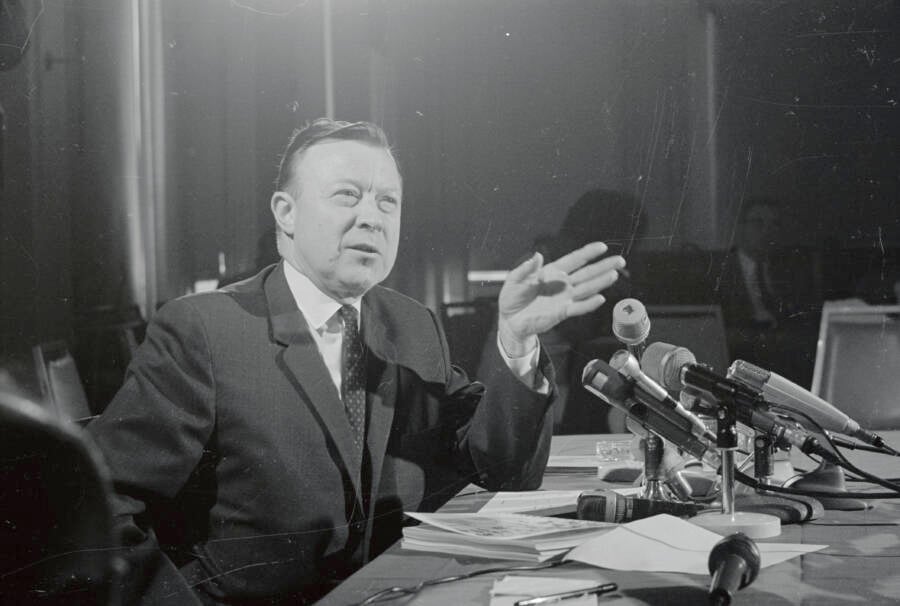
Bettmann/Getty ImagesWalter Reuther at the United Auto Workers 20th annual convention.
Walter Reuther retooled his factories to construct hundreds of bombers for the Allied fight against Nazi Germany during World War II. He would also organize the first Earth Day in history. Ultimately, only a tragic plane crash on May 9, 1970, would stop him.
The Awakening Of Walter Reuther
Walter Reuther was born on September 1, 1907, in Wheeling, West Virginia. His father, Valentine Reuther, taught his children to treat people with kindness — and that the laws of the day were anything but moral. As a child, Reuther was shocked to see Black citizens being forced to ride in the cattle cars of trains.
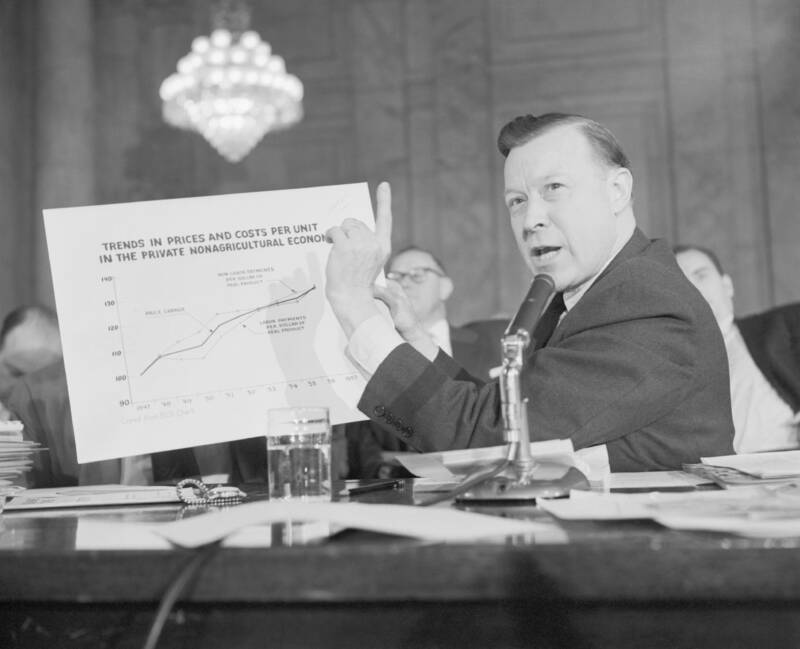
Bettmann/CORBIS/Bettmann Archive/Getty ImagesWalter Reuther testifying at an anti-monopoly hearing in Washington, D.C. on January 29, 1958.
“One day, the three Reuther brothers told their father some of the white kids were throwing stones at those cars,” said Bruce Dickmeyer, his son-in-law. “His father gave the boys a tongue lashing, saying, ‘If I ever see any of my sons do such a thing …’ He felt it was an injustice to treat other human beings like that.”
Reuther dropped out of Wheeling High School at 16. As an apprentice tool-and-die maker, he quickly learned how resistant the system would be — as he was fired for trying to unionize the workers. Armed with nothing but his principles, he left for Detroit, Michigan, in 1927.
With the auto industry booming, Reuther’s next job as overseer at the Ford Motor Company’s River Rouge Plant seemed ideal. Ford was beginning to roll out the Model T, which would become the most sought-after vehicle in America. The factory itself was state of the art, while the workers that ran it were treated like dirt.
Becoming A Union Leader In Detroit
Enrolled at Detroit City College (now Wayne State University) at the time, Walter Reuther strongly supported Norman Thomas of the Socialist Party for president. The stock market crash of 1929 demanded more immediate solutions, however, as unemployment soared and autoworkers were left with no safety net.
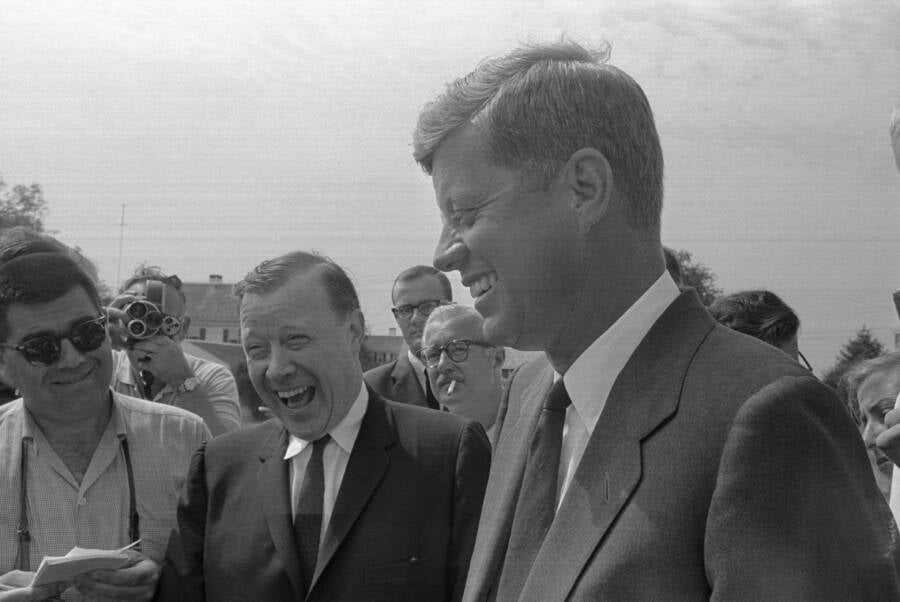
Bettmann/Getty ImagesWalter Reuther (center) endorsing then-Senator John F. Kennedy for President on August 3, 1960.
With the plight of Black Americans in mind, meanwhile, Reuther organized local protests while volunteering for the Thomas campaign — only to be fired from Ford as a result in 1932. It was the same year that Ford workers staged a hunger march, during which Ford security and Dearborn police shot five people dead.
Reuther and his brother Victor traveled to Russia in 1933 to train workers at the Gorky factory. The siblings learned a lot themselves, however, and were inspired by the idea that workers were the foundation of the state. Reuther returned to Detroit in 1935, when the United Auto Worker union was founded.
With the National Labor Relations Act passed and the right for workers to form unions in place, Reuther founded Westside Local 174. In 1936, he organized workers of General Motors in Flint to a sit-down strike that succeeded in February 1937. Chrysler was the second domino to fall — with Ford fearing it was next.
On May 26, 1937, Reuther and two colleagues donned suits and ties and handed out pamphlets to workers at Ford’s River Rouge Plant. The ensuing violence would become known as the Battle of the Overpass — and turned Reuther into a soldier for social change and economic justice.
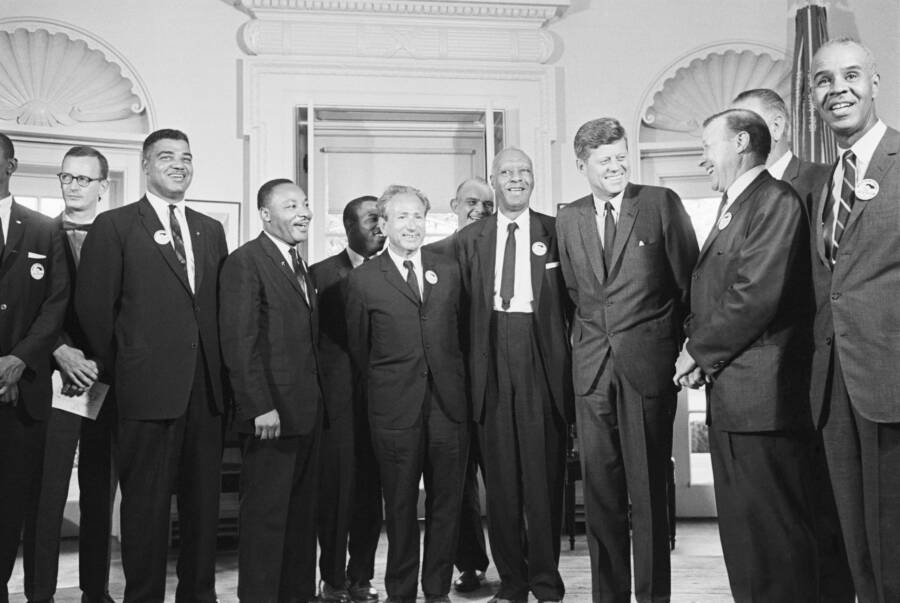
Bettmann/Getty ImagesPresident Kennedy with civil rights and labor leaders including Walter Reuther.
“A group of thugs from the Ford service department started walking towards them in a very menacing way,” wrote Harley Shaiken, a professor at the University of California, Berkeley. “The organizers were completely beaten up, one was thrown off the overpass, they had blood on them, it was ugly. One of them was Walter Reuther. That was defining for labor and for Reuther.”
Attempts On His Life
Walter Reuther survived an attempted abduction at a party he was hosting in April 1938. The masked gunmen would later stand trial, while their connection to infamous union-buster Harry Bennett was never disclosed to jurors. Then, Reuther turned his attention to World War II.
By the time President Franklin Roosevelt acknowledged the UAW in 1941, Reuther had already begun to retool auto factories to build bombers for the Allied invasion of Nazi Germany. As director of UAW’s General Motors Department, he oversaw the production of 500 planes.
At 9:48 p.m. on April 20, 1949, however, he was nearly killed yet again when masked gunmen fired a double-barrel shotgun blast through his kitchen window. Reuther was struck in the right arm and survived only by mere chance — as he was turning his chest toward his wife at that precise moment.
“He had a vision of society where workers made a living and had a decent life for their families,” wrote Shaiken. “For some, that idea was profoundly threatening.”
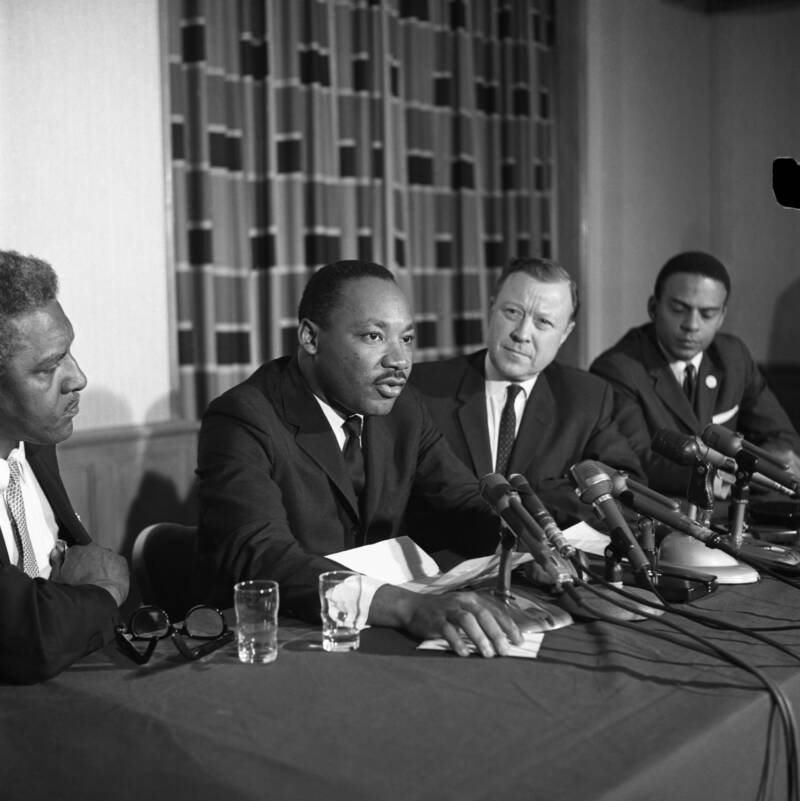
Bettmann/Getty ImagesDr. Martin Luther King and Walter Reuther during a “get-out-the-vote” tour on Oct. 30, 1964.
Reuther’s post-war efforts were considered by many to be his most tangible legacy, as the growing auto industry was forced to negotiate with its workers. Elected UAW president in 1946, he provided them with job security, vacations, pensions, and benefits, before fully turning his focus to the interlinked fight for civil rights.
“In 1963, Walter, Dr. King and the Rev. C.L. Franklin led 125,000 marchers down Woodward Avenue,” said Dickmeyer. “Dr. King had come to Detroit a week before and Walter gave him an office to use at Solidarity House. That’s where he penned most of the ‘I have a dream speech.'”
The Death And Legacy Of Walter Reuther
After directing the UAW to provide financial support for Cesar Chavez’s United Farm Workers in Venezuela in 1963 and organizing the first Earth Day in history on April 22, 1970, Walter Reuther and his wife perished in a plane crash bound for Blake Lake, Michigan on May 9, 1970.
Their Learjet 23 had departed Detroit in the rain and crashed near a UAW facility at 9:33 p.m.
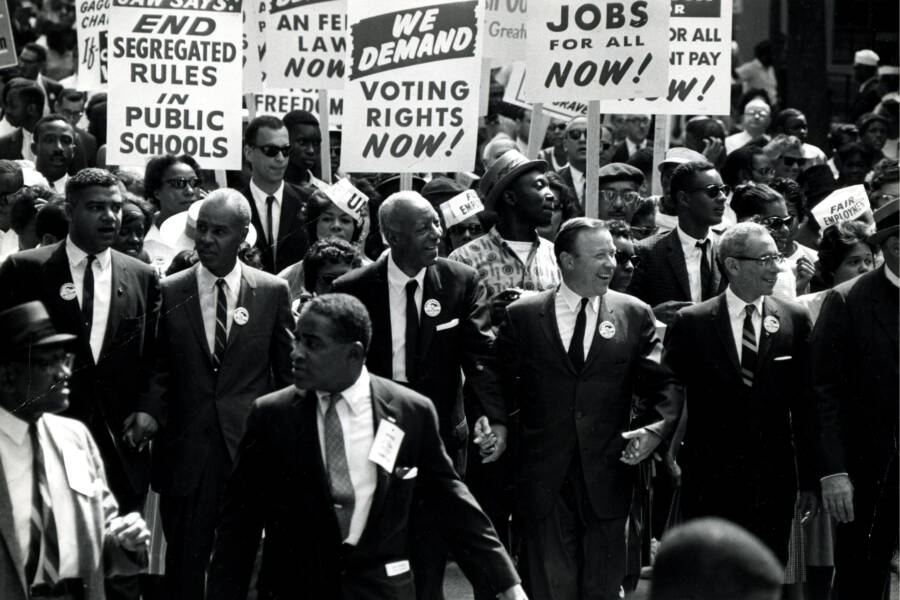
Rowland Scherman/USIA/PhotoQuest/Getty ImagesWalter Reuther participating in The March on Washington for Jobs and Freedom on August 28, 1963.
None other than Coretta Scott King eulogized Reuther him on May 15 at the Ford Auditorium in Detroit. Remarkably, an estimated 3,400 people flocked to his funeral procession.
“Walter Reuther was to Black people, the most widely known and respected white labor leader in the nation,” King said. “He was there when the storm clouds were thick. We remember him in Montgomery. He was in Birmingham. He marched with us in Selma, and Jackson, Mississippi and in Washington.”
“He was a big man so, of course, he had enemies and detractors. He had the courage to be with the minority when it was right,” she continued. “He was a simple man in his personal life, a rare quality in these flamboyant times … but if his ways were simple, his ideas were grand. He aroused the imagination of millions … He was fighting the fight of the whole world.”
After learning about Walter Reuther, read about Louis Zamperini, the Olympian who became a WWII hero. Then, learn how Edward Bernays became the “father of public relations.”





